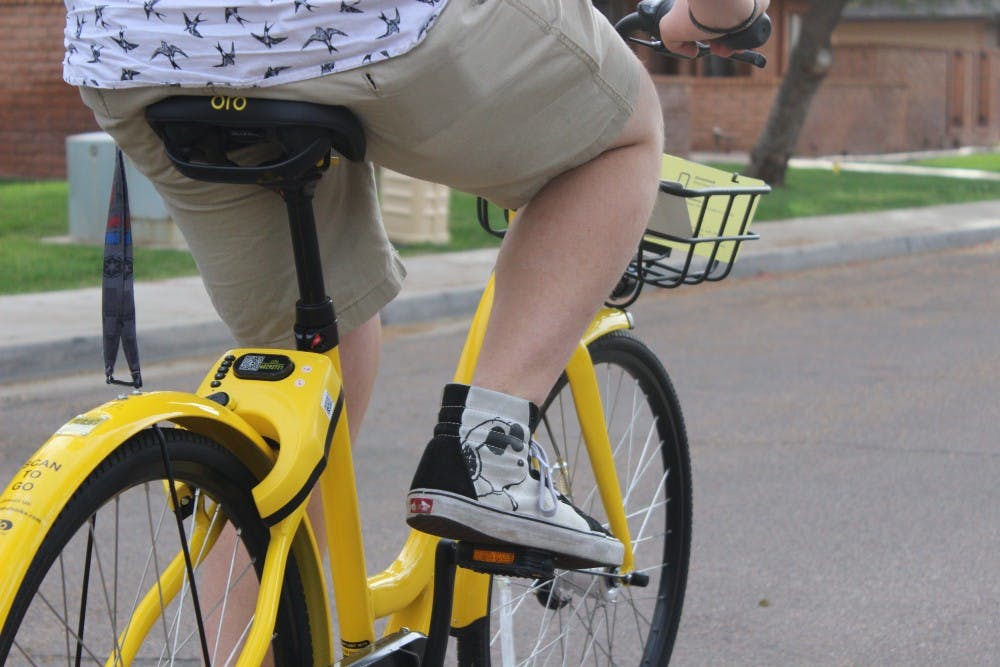Members of the ASU community who are looking an eco-friendly means of transportation should keep an eye out for the numerous bike sharing companies around campus.
Rentable bikes from companies like Grid, ofo and Spin are scattered on and around the Tempe campus, spurred by the rise of the gig economy.
Bike sharing is a service that makes short-term transportation options available to the public. Many of the companies have mobile applications that allow customers to locate a bike or scan the bike's QR code in order to unlock it. When users are done, they can park the bike and check it back in to the app, leaving it available for another person to use.
Grid was one of the first companies to bring bike sharing to the Valley. Their bikes must be checked in and out from physical stations around the Phoenix area.
But companies such as ofo have bikes that are not linked to physical hubs, providing greater flexibility for users.
Taylor Bennett, head of communications at ofo, said even though they are a global company, ofo is excited about expanding to different areas in North America, including college campuses.
“We’re excited about our continued expansion throughout the U.S. and thrilled by the responses we’ve seen from cities and communities thus far,” he said.
Bennett said bike-sharing companies like ofo can offer affordable ways to get from place to place.
“At our core, we are committed to creating a more equitable, accessible world,” he said. “We do this by offering a more affordable transportation option for anyone, anywhere.”
However, there have been problems with dock-less bike sharing. Some cities in the Phoenix area have received complaints from citizens because customers decide to park the bikes anywhere, but the city of Tempe is most worried about safety for now.
Nikki Ripley, public information officer for the City of Tempe said security and the well-being of the community is a priority.
"Safety is top of mind for us," she said. "We work with the companies and other cities to ensure the safety of the city."
The rise in popularity of bike transportation has helped to facilitate the arrival of bike-sharing companies like Grid and ofo to ASU's campuses.
According to Grid's latest report from February 2018, the City of Tempe registered 4,526 trips in the month, averaging 159 trips per day.
Shawna Hash, regional operations manager at Grid, said bike transportation and bike sharing have gained popularity over the years because people are starting to become aware of the environmental benefits.
“There has been a recent rise in bike traffic because there is a large shift in focus on the environment,” she said. “People are becoming more aware of the impacts of biking transportation."
Jill Reyes, a masters student studying urban and environmental planning, said bike shares are a great resource to for quick travel because they are accessible throughout campus.
"They are accessible for use on campus because they have stations or apps to show where bikes are located," she said. "It is a great resource to go from one side of campus to the other."
The University found ways to monitor daily bike traffic in response to the popularity of biking on campus.
ASU's School of Geographical Sciences and Urban Planning has found a way to monitor the daily traffic of bikes by installing bike counters at important areas on the Tempe campus.
Trisalyn Nelson, director of the School of Geographical Sciences and Urban Planning, said they wanted to collect data because it is the best way to let people know the impact bikes have.
“When we analyze that data, we often need to have information on who's riding and how many riders there are,” she said. “People are concerned about how bike lanes will impact vehicle traffic, and we needed to have a way to let people know the exact impact.”
Reach the reporter at smpere10@asu.edu or follow @therealsperez on Twitter.
Like The State Press on Facebook and follow @statepress on Twitter.




